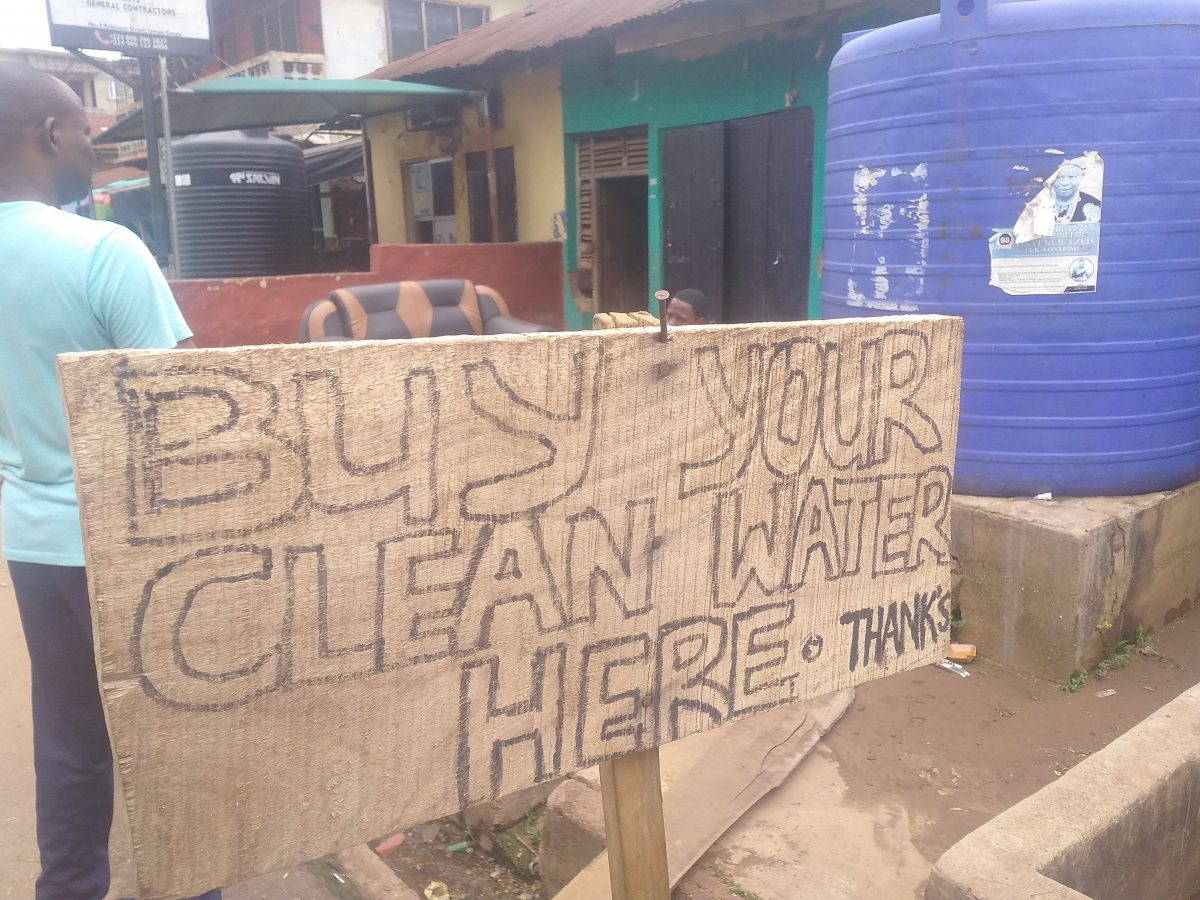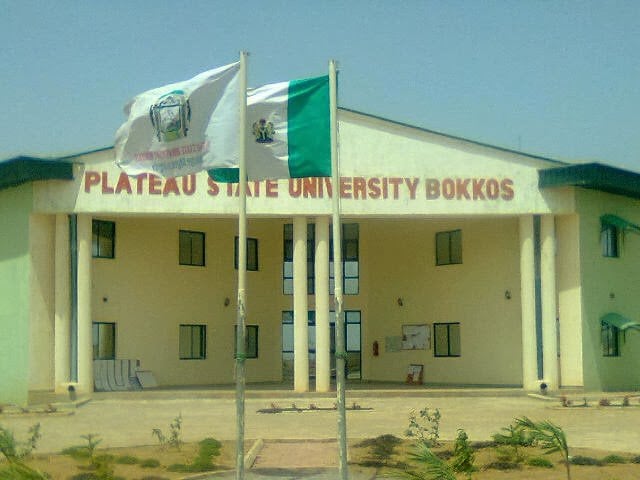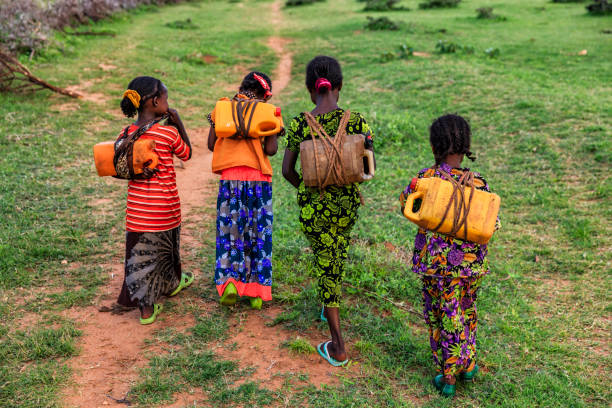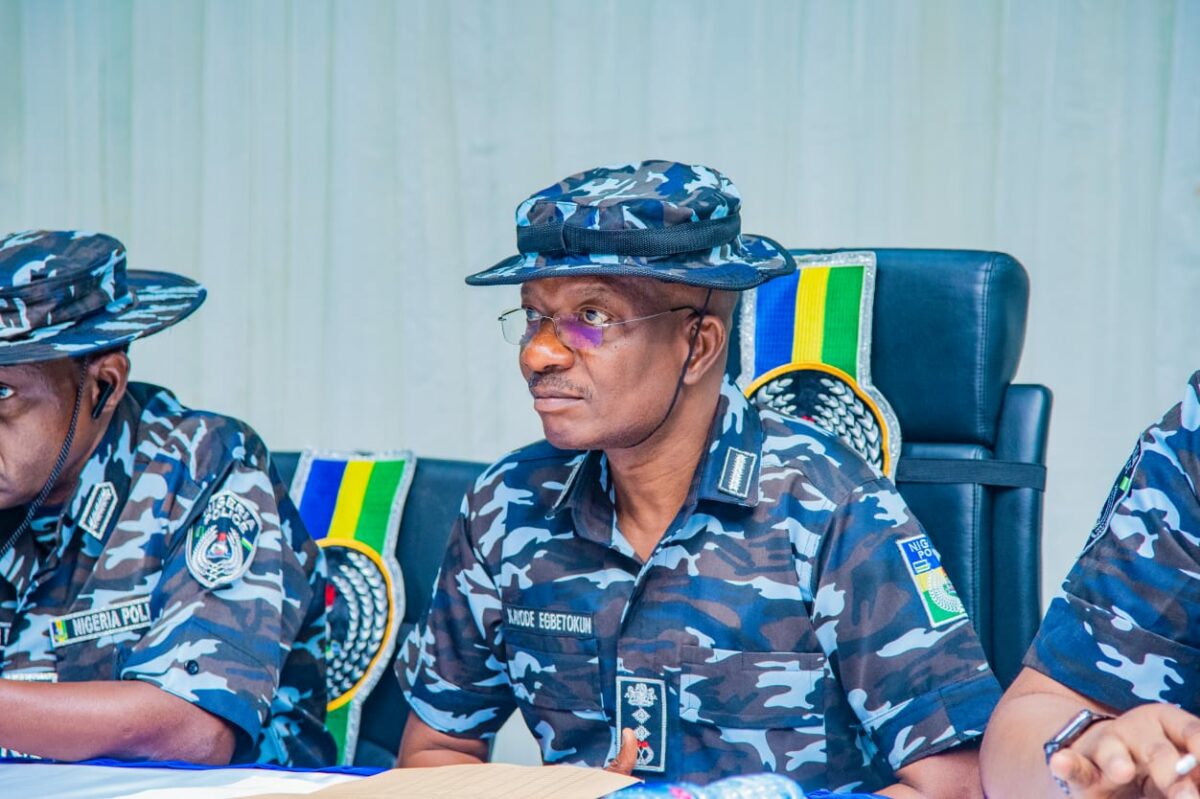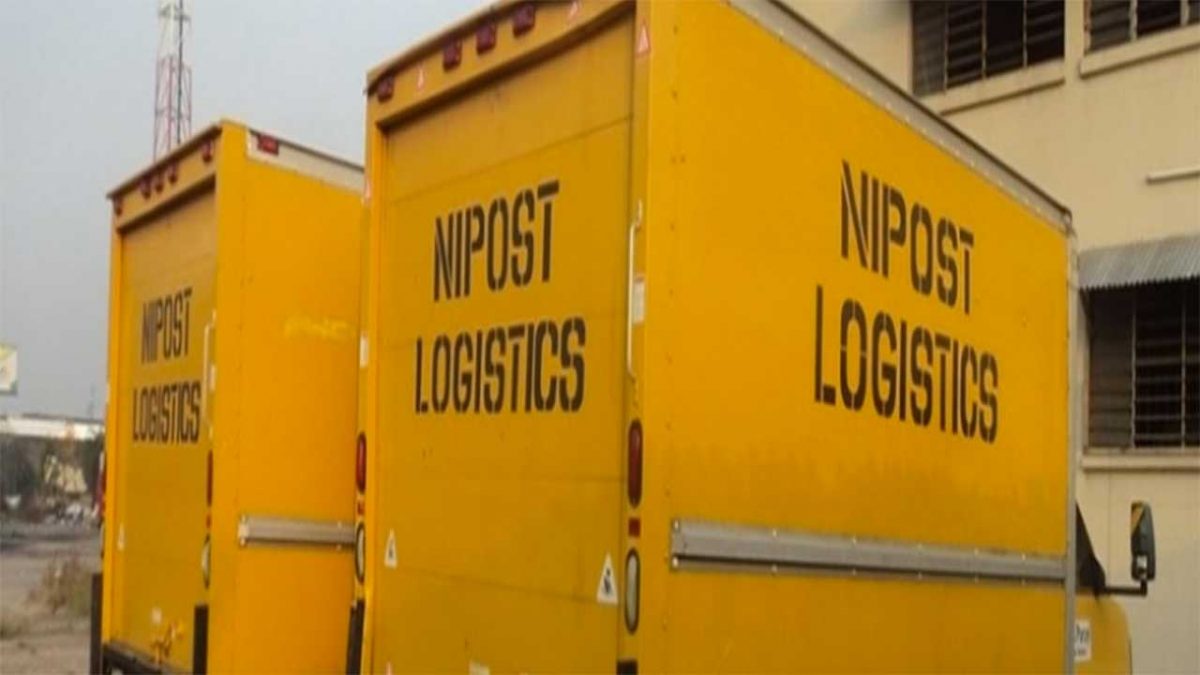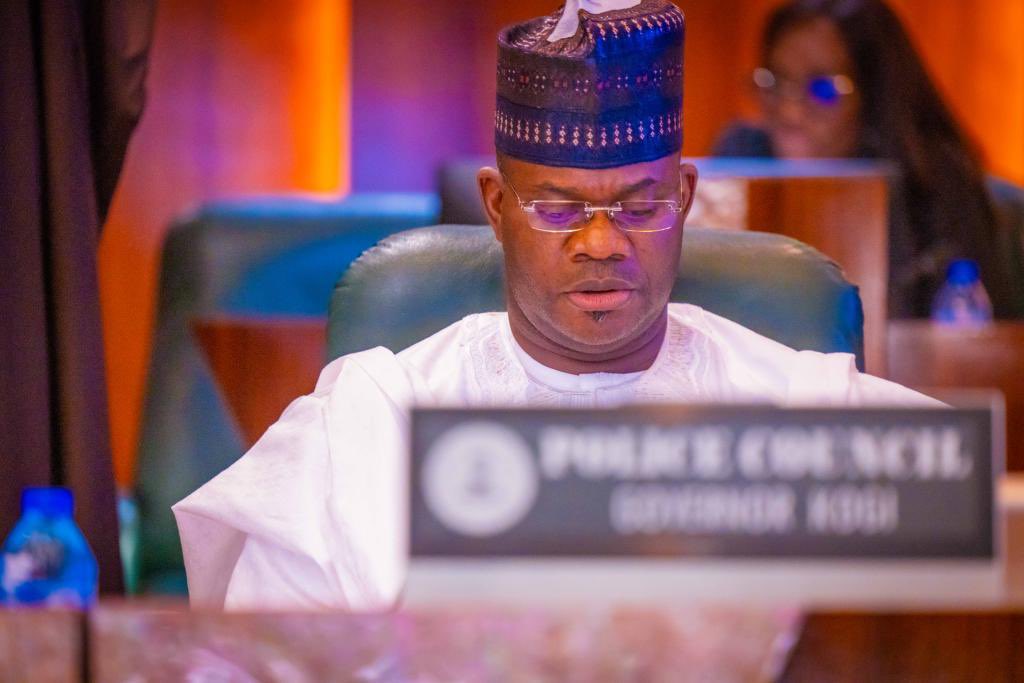Most parts of Enugu State have struggled with seasonal water scarcity for decades. Some towns have also been without access to clean water since the 80s. The dearth of water continues to hold huge consequences for the quality of life in Enugu to the extent that water from soakaways has now found occasional domestic use, writes JOSEPH ADEIYE, who spent a week in the state.
Arriving in Enugu in the first quarter of the year can be quite troublesome. Lower levels of atmospheric humidity might not make it obvious but the reddish-brown streets tell tales of a land that has been thirsty for years.
“People are suffering for water…we are suffering for water,” a middle-aged resident of Enugu said with enough dose of solemnity. The dry tap in front of his yard would have nodded in agreement if it could just shake off the rust on its neck that hot Wednesday afternoon.
Enugu has been grappling with water scarcity for so long. There also seems to be no workable solution to the problem in sight, ensuring the issue has also grown to become a characteristic of life in the coal city rather than a dangerous challenge requiring urgency.
So, when most people speak about the water scarcity that often gets to its peak in the city between November and March of every year, they always end their complaints on a note of powerlessness — “but what can we do?”
WATER WILL REACH YOUR ROOM, WAIT… FOR FOUR HOURS
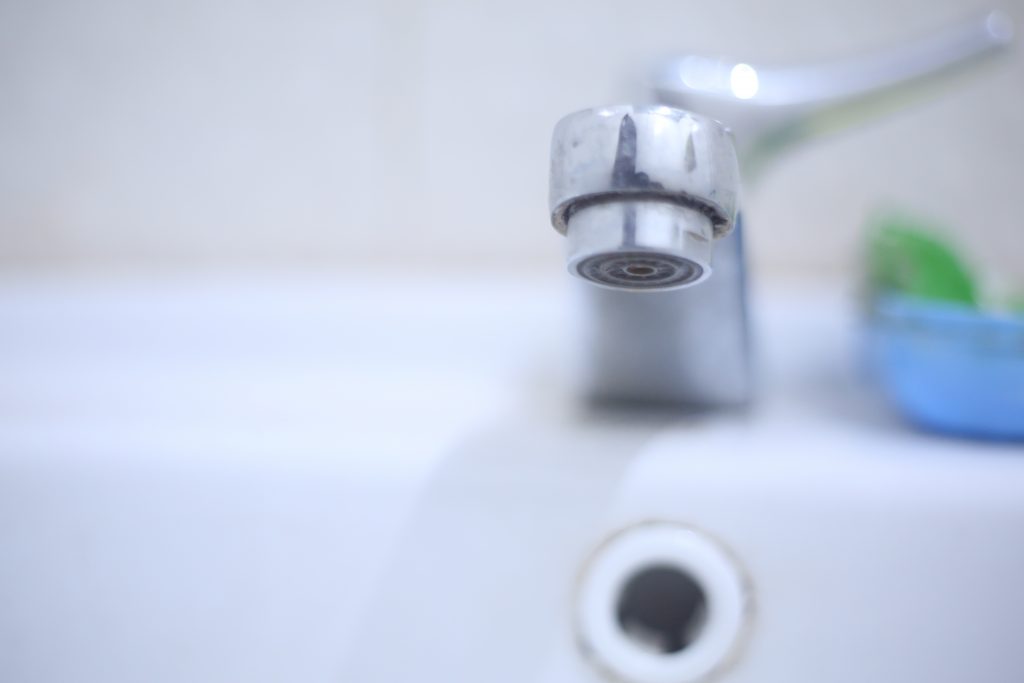
Enugu’s water problem is not strictly for residents; there was no water in the taps of the hotel where this journalist lodged after arriving in the state.
“Sorry sir, we are pumping the water now,” a hotel official said. “Water will reach your room, sir. Wait.”
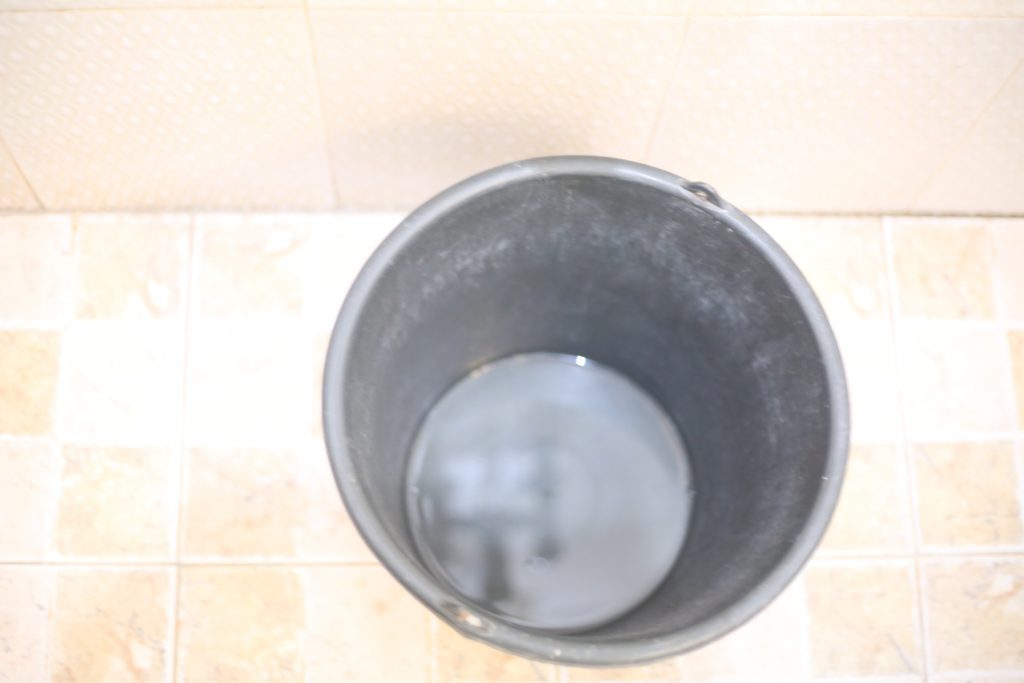
The patient wait went on for hours before the sound of water finally trickled down from the bathroom tap.
A morning shower eventually became an afternoon bath, four hours after. Days later, I had to choose between waiting to have water in my room and missing my flight back to Lagos.
READ ALSO: INVESTIGATION: From Enugu to Anambra. The Terror of Bandits, Herdsmen, ESN
WATER IS EXPENSIVE
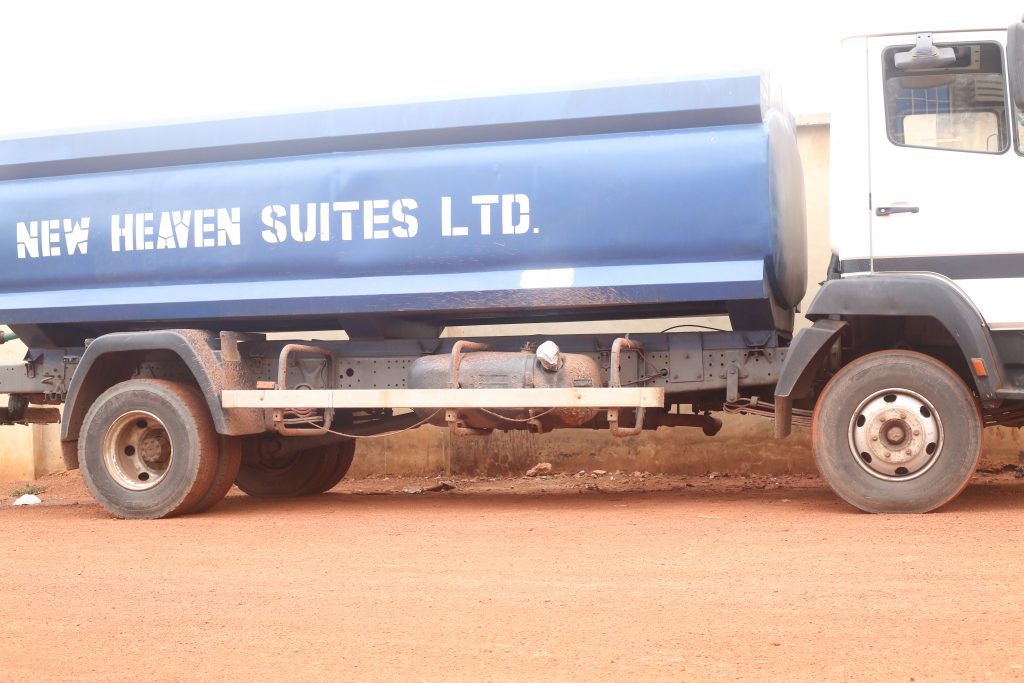
“Water is expensive in Enugu; everything is now costly,” says Gift Okafor, a POS operator who is originally from Delta state.
“I live in Independence Layout. We don’t have water at all. This is something that everybody in Enugu knows. And it is not only happening in my area. We have to buy sachet water to drink, we need to buy water to bathe, we must buy water to wash. We pay for most of the water we use there in Independence Layout.”
As the operator narrated his ordeal with water and the cost, he pointed at the water tanker used by my hotel.
“Even the big places cannot rely on water from the ground,” he said. “Boreholes are expensive to sink and maintain. You must get your millions ready because you will keep digging as the years go by. The water will still be dirty.”
True to Gift’s words, a hotel attendant affirmed that the hotel got its water elsewhere, as it was not feasible to obtain sustainable amounts of water from the ground. The hotel owns water tankers with which it fetches water from towns closer to waterlines.
“No, our water is not from a borehole or tap. We have to fetch from elsewhere,” he explained. “If we don’t get the water with our tankers there might be no water for days sometimes. We have to buy and fetch the water using those water tankers to be able to have water in the rooms every day.”
Countless water tankers ply Enugu highways branded with promises of clean water, and usually bearing the bold imprints of the names of their owners. The cost of water has now taken a high toll on organisations, like hotels, such that it is now rationed. Water use is regulated in suites by allocating certain litres to rooms per day or blocking the flow of water into taps at night.
TOWN ON A HILL
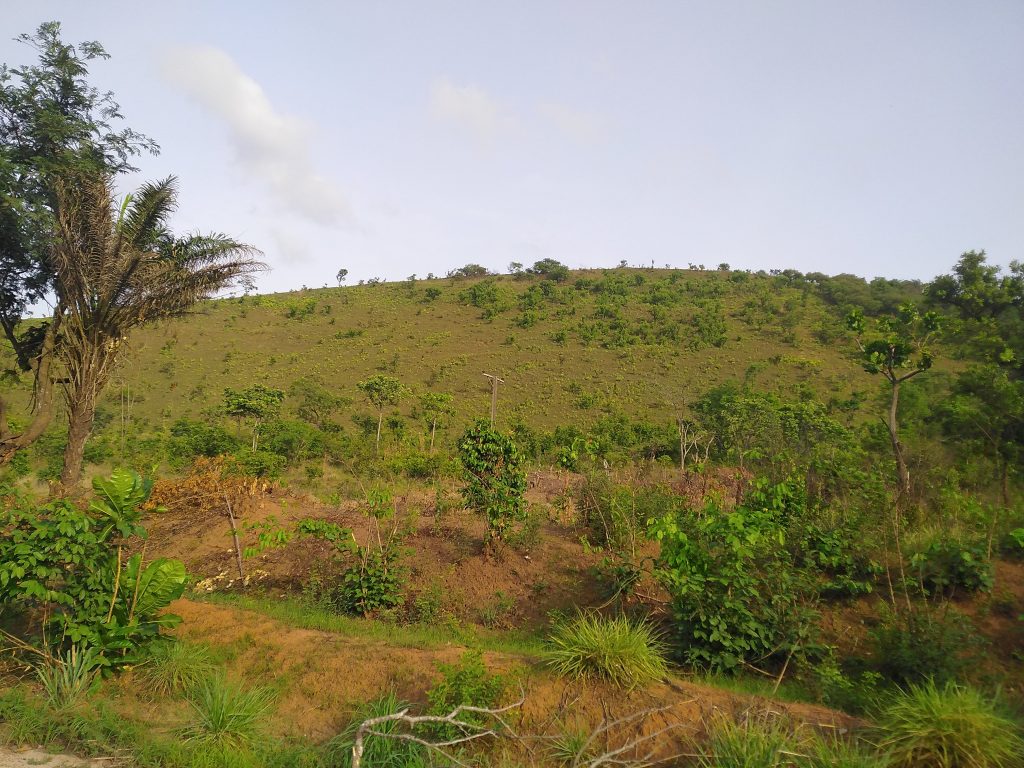
The root cause of strained water supply in Enugu is the land on which the city is built. It is a state with many hills. The town itself sits atop a hill and the literal meaning of Enugu is a town on a hill. This is why its inhabitants would have to drill deeper to find water in the ground.
“The word Enugu itself means ‘on the hill,'” said Onyinye Udeh, a public servant and freelance broadcaster. “I have once woken up as early as 1am to look for water. It can be that bad because many places cannot readily reach water sources in the ground.”
But the height of Enugu above sea level is not the only natural reason clean water cannot be readily found in the ground. Coal has been an undeniable source of wealth to the city. The powerful mineral has however cost the state so much since its exploration began in the 1900s.
The Bureau of Public Entreprises claims that Nigeria is loaded with inferred coal reserves of about 2.75 billion metric tonnes. Although the coal residues are spread across 13 known states in Nigeria, Enugu possesses the most coal mines and coal fields. Since the land in Enugu is so rich in coal residues, black chaffs are often excavated as people dig to find clean water.
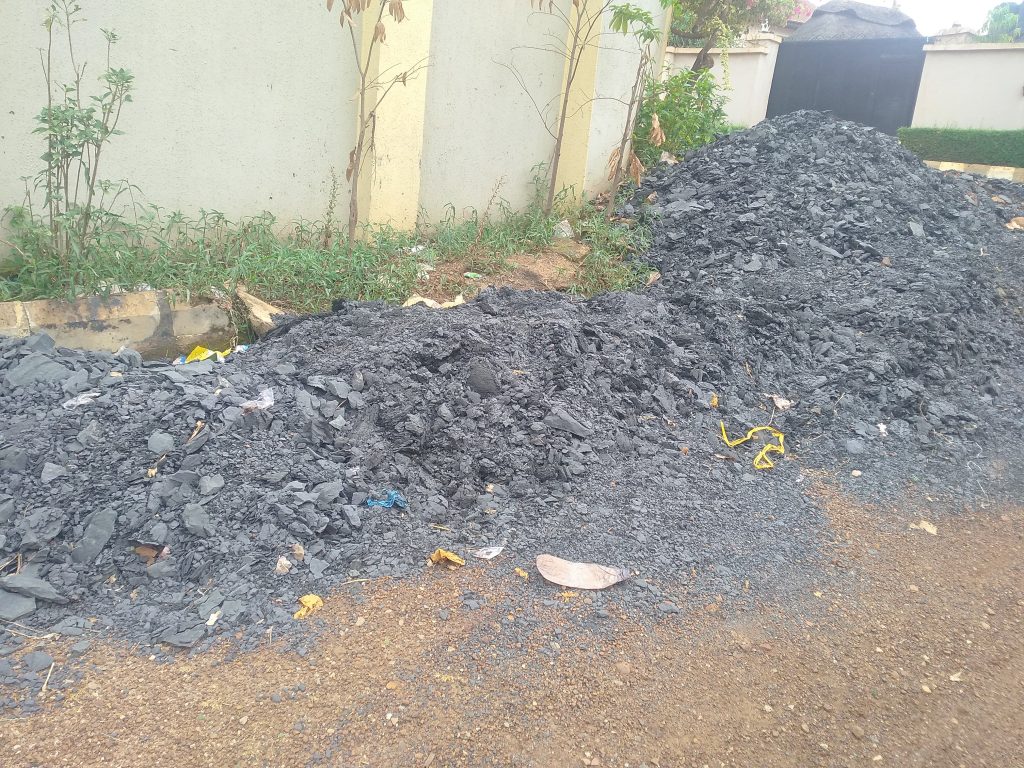
THE 80-YEAR-OLD DREAMING OF CLEAN WATER IN HER LIFETIME
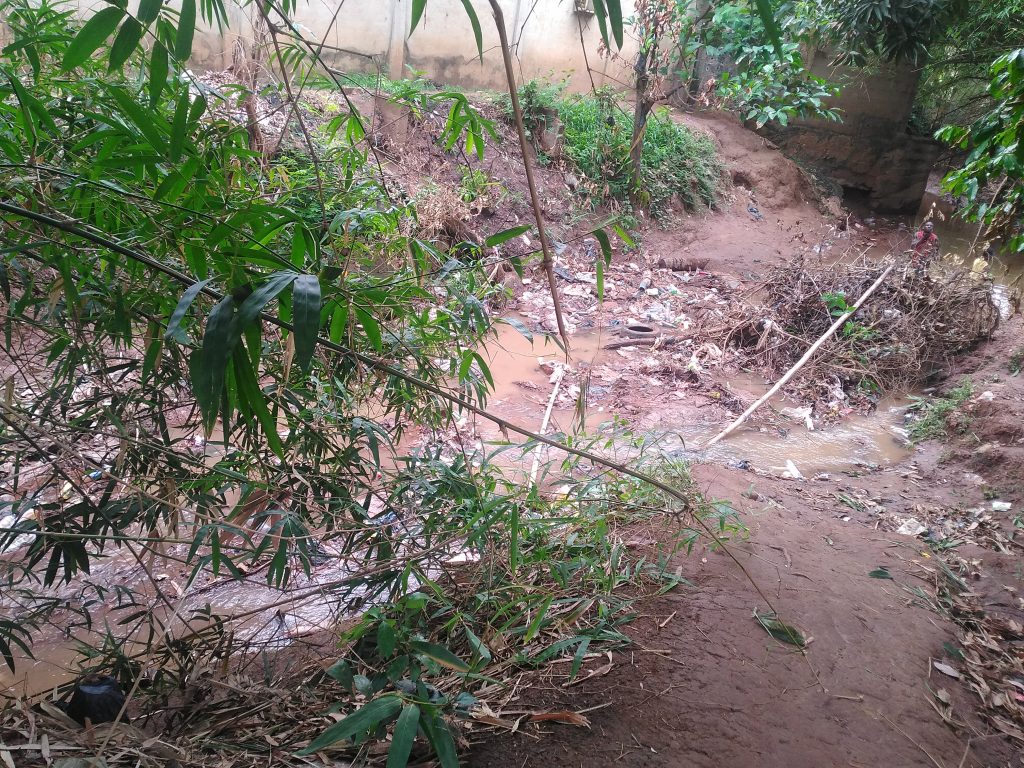
The towns around Enugu have also endured seasonal drought but at different times and for varying durations. While areas such as Independence Layout and GRA have faced water scarcity in the last 10 years, remote towns such as Uzamagu have never benefited from potable water for several decades. These communities have no taps, no boreholes and no wells.
Non-profit organisations and non-governmental organisations have combined efforts to help communities such as Uzamagu in the past. More recently, GiveWater Foundation visited Uzamagu to record its struggles with dirty and inadequate water. The non-profit organisation plans to raise some money to create new water sources for Uzamagu through crowd funding.
NO WATER IF YOU DON’T SET OUT AT 4:30AM
Indigenes of Uzamagu fetch water from shallow streams and recover brown water. They have always relied on purifying the water they fetch themselves using alum and boiling the water. Even the aged said they were not sure if they would ever see clean water in Uzamagu in their lifetime. An 80-year-old granny told the NGO that she does not expect to see clean water in her community anytime soon.
GiveWater Foundation is raising N3million through donations and sales of photographs as non-fungible tokens in order to sink a borehole in Uzamagu.
“In one sentence, what we do is use photography and crowdfunding to give rural communities in Nigeria access to clean water,” Mayor Otu, founder of GiveWater Foundation, told FIJ.
He and his foundation lived in this community for a week, eventually documenting the realities of drought in Uzamagu.
“When I spent a week in Uzamagu, I was shocked and heartbroken. I have seen a lot,” he said.
“There was something about this place. Growing up, I used to hear that there is a purifying agent, alum, for water. I had never seen it before.
“A lot of communities used to send me pictures, telling me to come over so they could hopefully get water. Some people just picked up dirty water and took a photograph. They made it look good so I could come.
“If they need to fetch water they have to go out as early as 4:30am for that dirty water. If you don’t go out early enough, you won’t find.”
NO SOURCE OF CLEAN WATER IN UZAMAGU
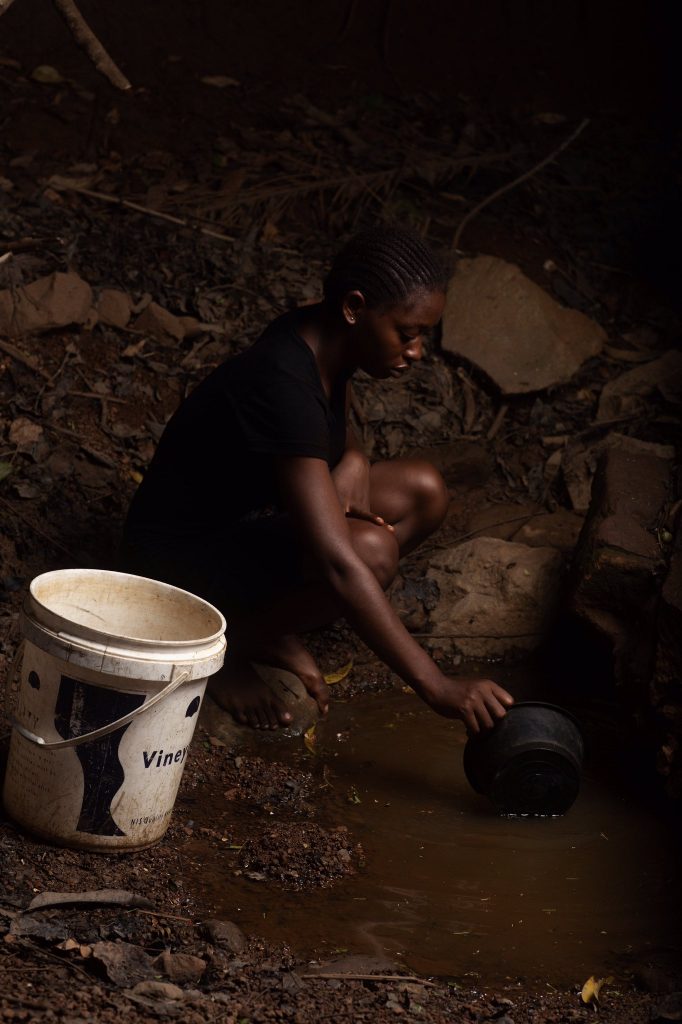
There is no source of clean water in Uzamagu. The residents of the community use Alum as the only purifying agent they have on the dirty water they gather. Alum has its own adverse effects on the body.
Water-borne diseases are a constant risk for communities like Uzamagu. GiveWater Foundation also took note of the psychological effects of the use of dirty water on people in this Enugu town.
“They have to fetch the water and pour it in a big drum and add alum. That was my first time seeing people put alum inside water and waiting for three hours to see the water clear up. It wasn’t very pleasant,” Otu continued.
“I saw people’s skin with rashes, breakouts. At that point, I realised it wasn’t about waterborne diseases alone. This affected women and how they felt about themselves; it dealt with their self-esteem. They don’t feel good about themselves; they don’t feel beautiful because they feel like they are bathing with dirty water.”
A HEARTBREAKING STORY
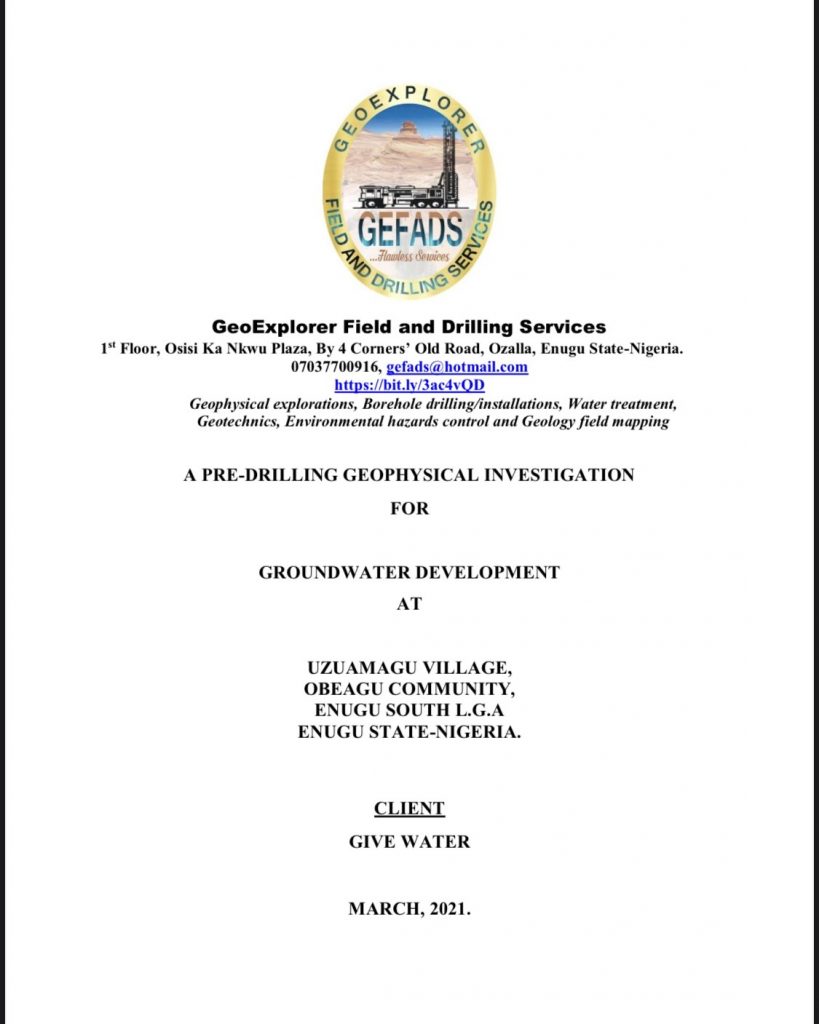
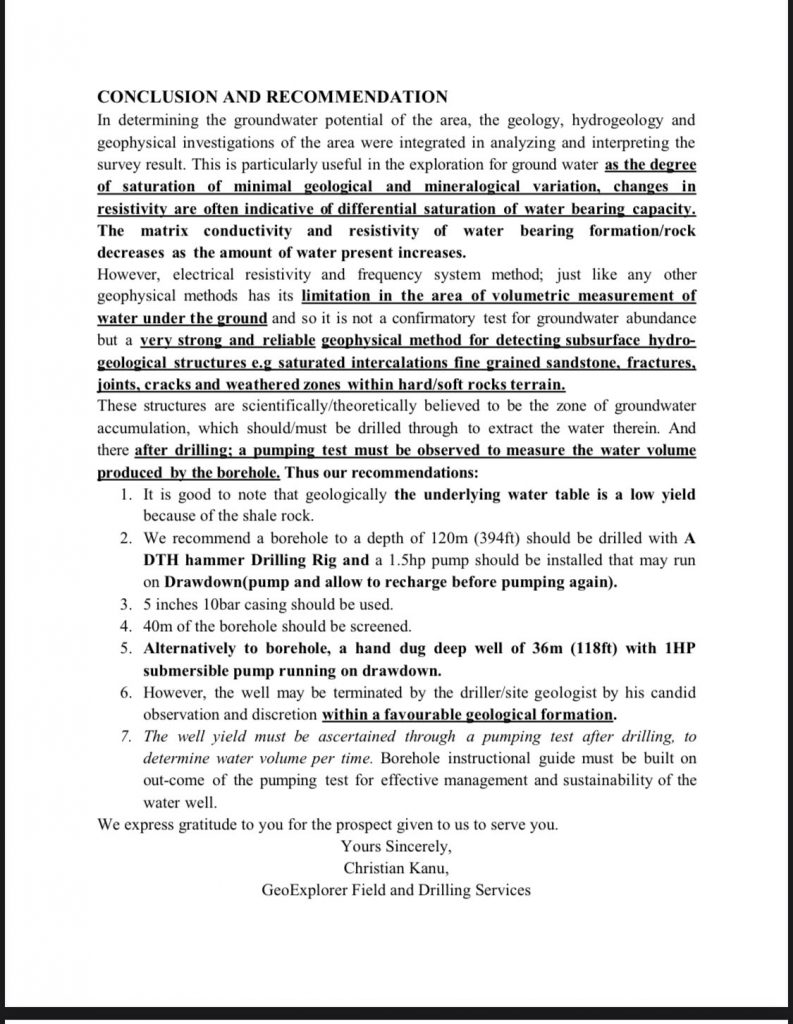
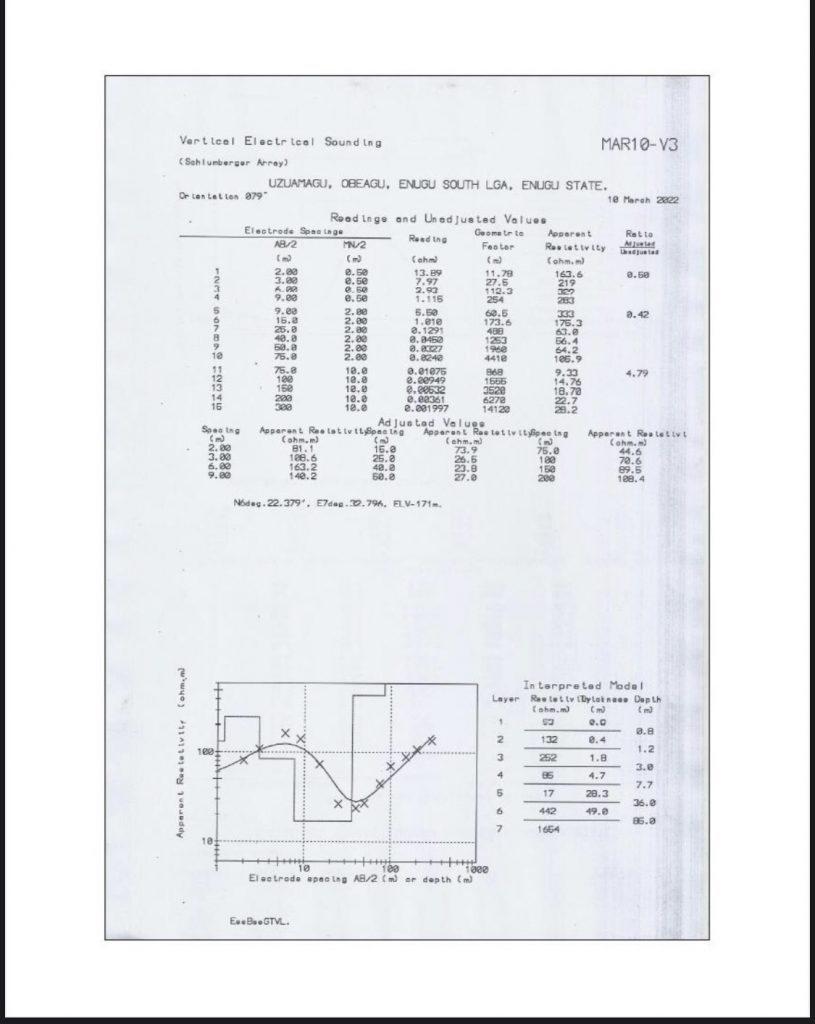
The cost of setting up reliable water systems such as boreholes has rendered Uzamagu powerless in the face of their most basic needs. GiveWater Foundation estimates that over N3 million is needed to set up a moderate borehole for Uzamagu.
“It was a heartbreaking story,” Otu said. “My team envisioned this might only pump around 500 litres and it would cost around $8,000 and $10,000.”
A community primary school and a distant primary healthcare centre serve as the only government footprints in Uzamagu. However, neither of these institutions is equipped with potable water too.
The problematic psychological toll of drought on the people of Uzamagu has robbed them of hope. Natives doubt if any help can come from either the government or philanthropists. Only a few hope for a future with the provision of clean water in their community.
WHEN THERE USED TO BE WATER…
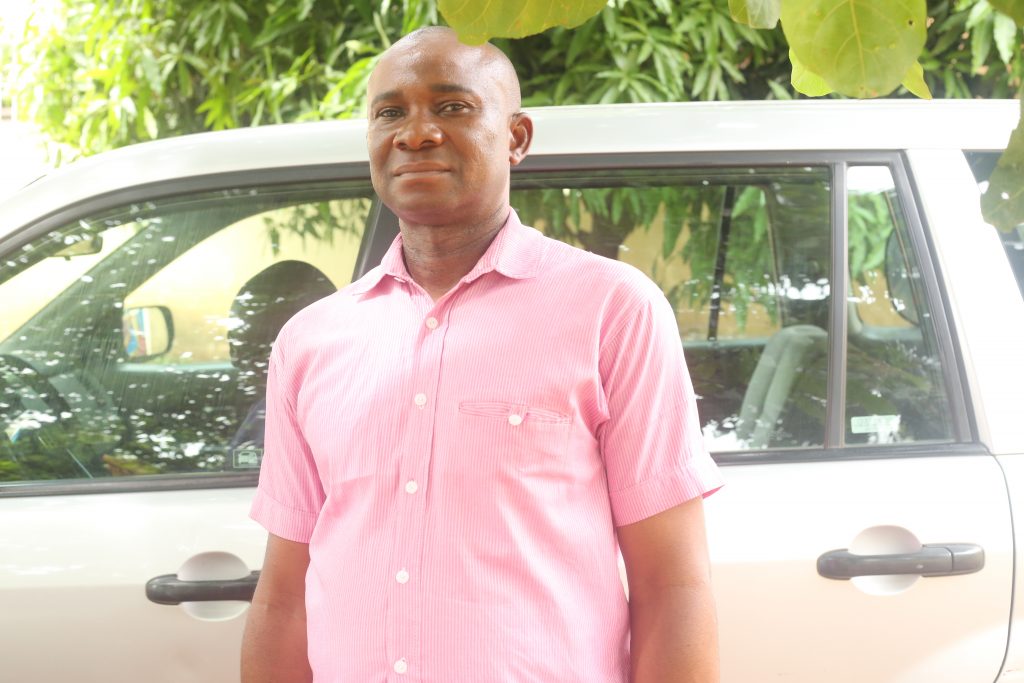
Chika Anthony, who works with the National Orientation Agency (NOA), lives in Achara Layout in Enugu. When Anthony sat down to talk about his experience on water shortage in the area, he got very emotional.
Anthony recalled that there was a time Enugu had water in abundance through the operations of the state’s water corporation. The taps, he recalled, suddenly stopped working as frequently as they ought to and the struggle for water began.
“I’ve lived in Enugu for the past 25 years. It has been a very difficult time, especially now. People are finding it very difficult to source water. There was a period when water was flowing in all parts of Enugu,” Anthony said as he looked straight ahead at a locked well.
“I currently reside in Achara Layout. I was initially living in Uwani. Some parts of Achara Layout had water; the taps were running. That was about four years ago.”
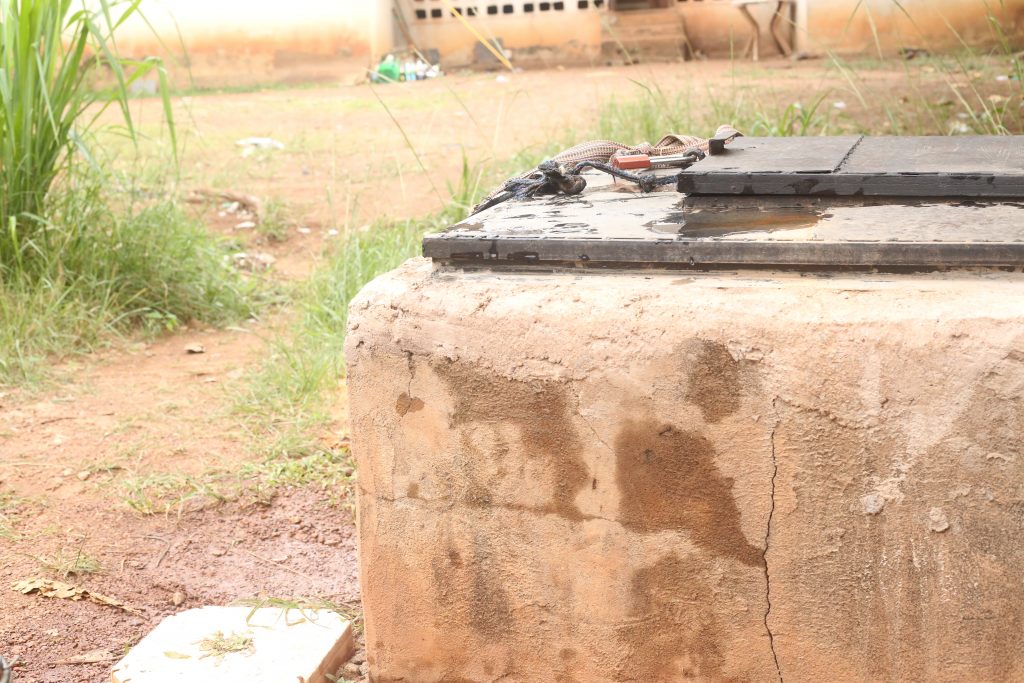
WATER-SHARING TIMETABLES FOR FAMILIES
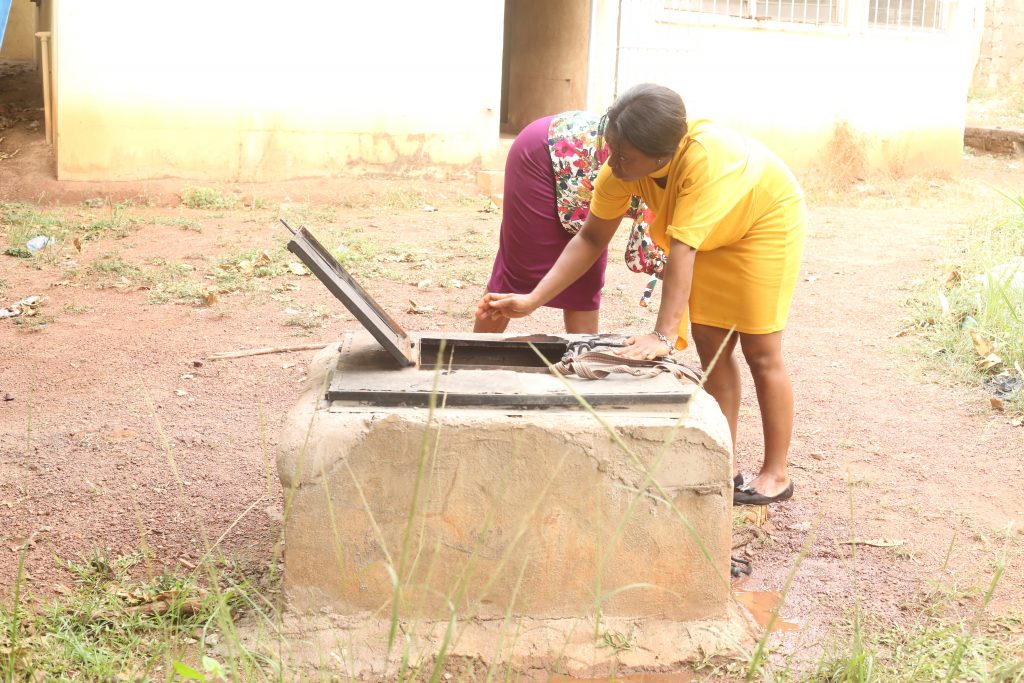
The protected well was built inside the NOA office in Enugu.
“If you get to Mayor area, there are some big pipes meant to supply water,” he continued. “A couple of years ago, some of these pipes were broken during a road construction or so. As a result, water was no longer flowing to every side of the state. But some taps were running. This time around, none is functioning.”
Anthony’s entire neighbourhood was littered with gigantic plastic tanks used in storing water. These tanks receive water from the tankers paid to deliver water to households. Wells were also ubiquitous. Almost every building was complemented by a well. Some houses even had two.
“It has become difficult for some families because they share the water from the well. There are timetables for families in a compound to determine their turn to fetch water,” he revealed.
“Sometimes, the landlord just locks the well up. They will lock the well so that no one fetches from it for a while. In some places, whoever wakes first gets water.
“You have to set an alarm to rise early. If you sleep off and wake up late, there won’t be any water left for you. This is because what comes out is never enough for the families to make use of.”
But the water from the wells is not clean. As a result, such water is mostly used for washing.
“The 500 gallons of water we used to buy for N5,000 now cost N6,000. Another thing you need to know is that they may even choose not to come whenever you call them for supply,” he continued.
“You really have to book and keep making continuous call for them to show up. So, most times, the water we use to cook is sachet water. We buy it; a bag now is N200. So you buy for cooking and for drinking. The one from the well is mostly for washing and other domestic use. Apart from our area, some areas buy the 500 gallons at a higher rate. It depends on the bargaining power.”
The economic implications of paying for water at all times has also taken its toll on Enugu residents. Beyond the water expenses, the fact that such a basic necessity is denied many people is clawing cruelty. Anthony told me how residents cannot have their baths whenever they need to.
“If you visit Uwani, around Kenyatta and Robinson, you will see a lot of people queuing up for water,” he said. “We are forced to ration water, even the children cannot use it however they want.”
‘SOMETIMES, PEOPLE FETCH WATER FROM SOAKAWAYS’
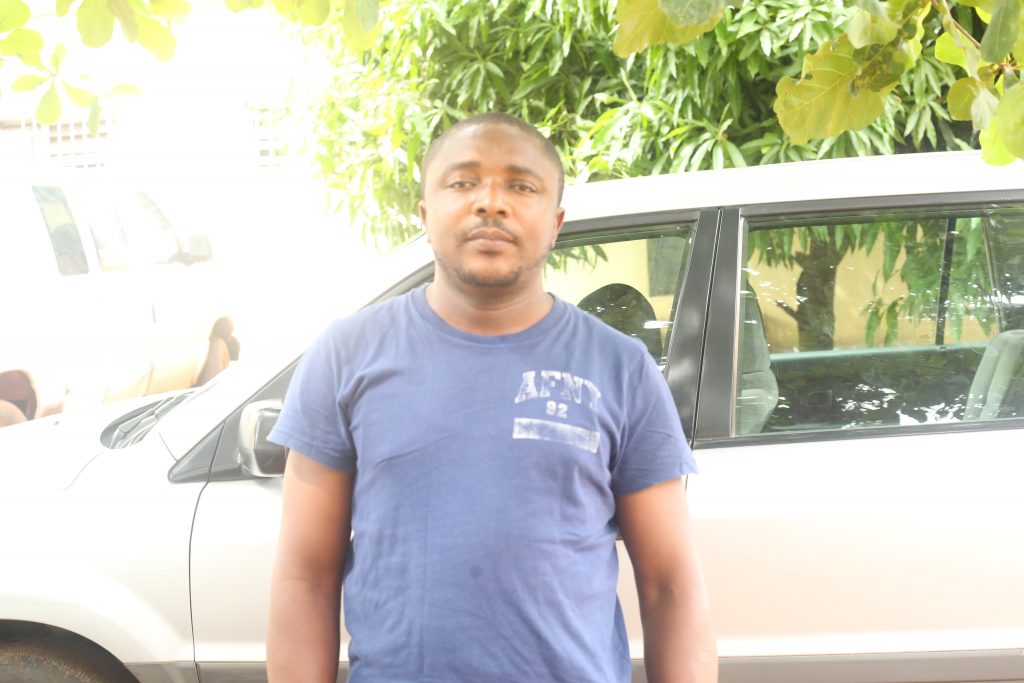
Buchi Chidi, an Enugu indigene who lives on Independence Layout, has never seen water rush out of a tap. “Our primary source is the well and it is seasonal,” he said. “We are forced to use that water despite how contaminated it looks.”
The wells around Abakpa and Uwani contained “black water”. The one in Buchi’s neighbourhood was no exemption.
“You can wake up in the morning and see some oily particles on the water surface,” he said. “This same water, when you try to wash with it, it kills the lather the soap is supposed to generate. We end up using it for toilet purpose.”
The amount of coal deposits in the land has deeply affected the soil in Enugu. Areas with coal residues mostly have contaminated water seeping out of the wells. Buchi, like Anthony, also mentioned water cost as a major problem in Enugu.
“Apparently, most people have to pay for water with cash and patience,” he said.
“The 500 gallons of water I bought from water tanker suppliers two days ago cost N7,000. It took me like two weeks to get that supply. After reaching out to the tanker drivers, I keep calling them. They tend to be very busy during the dry season.
“Just recently, an individual came up with an idea, he called it Water on Wheels. He introduced some five or six tankers and you can book online. But it is still not working. The situation of water in Enugu state is a terrible thing.”
From Buchi’s perspective, the annual dwindling water supply can be ameliorated.
“There are some other places we’ve been to in Nigeria. It’s almost the same situation. By the time we have dams it may be better. For instance, we have Oji River. We have Adada Dams in Nsukka. What is so difficult in reticulating this water?
“The best thing you can do for an Enugu person today is to give constant supply of clean water. This is what can make an average Enugu man happy. So we don’t care what it would cost us to get this.”
The more Buchi spoke about the realities of water demand, the more ludicrous he sounded. Enugu residents go to extreme lengths to manage water. They also seek to find water in the most unlikely places.
“Sometimes, you see people fetching water from soakaways. Just around my place, there is a little stream there in Okilo. That stream, we don’t know where the water is coming from. Very dirty; people dump their refuse there.
“Despite all this, you will see residents come out to fetch the same water. When I lived in Depot, around Police College, everywhere was dry. If you like wake up at 2am, you will not fetch more than a bucket. That water is also not neat.”
’99/100 ENUGU RESIDENTS COMPLAIN ABOUT WATER’
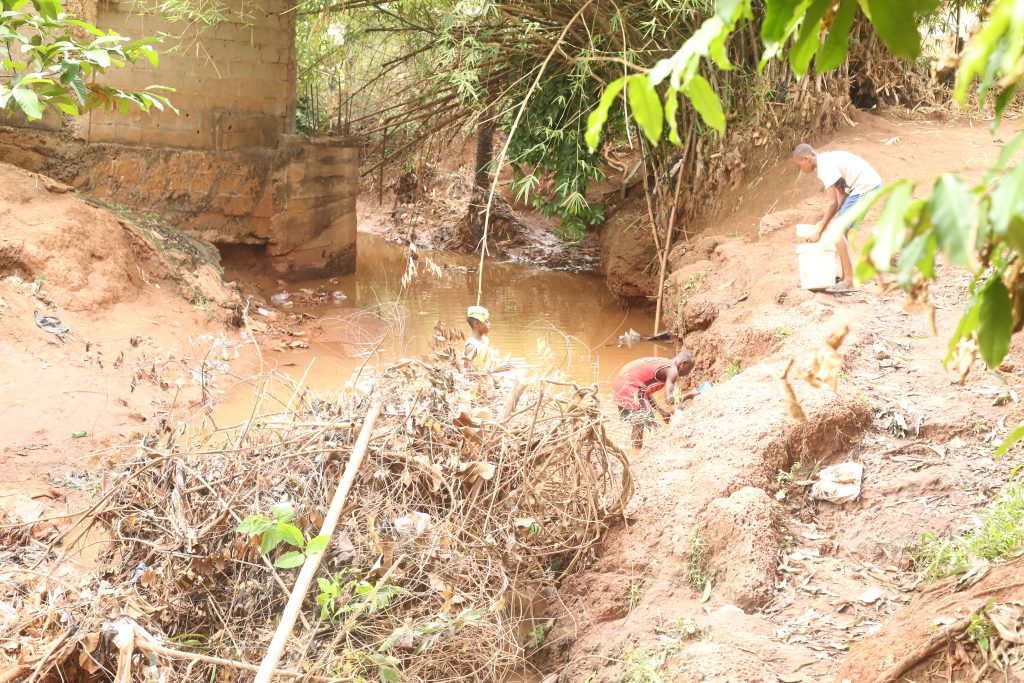
At the stream in Okilo, along Ugwuaji Road. The water in the stream is indeed unsuitable for any house chore.
Buchi strongly doubts the ability of those working to improve water supply in the state. In his own words, the state’s water plan is running on an ‘inefficient’ system.
“The whole system is very inefficient, it doesn’t work. If you meet a hundred Enugu residents today, 99 will complain about water,” he said.
“In this part of the world, an average adult still moves into the bush to answer the call of nature. This is because they want to manage water. Sometimes, even me, in my own house, I find it very difficult to urinate many times — because every time you urinate in the water cistern you have to flush. That flushing demands water.
“I do my best to see how I can minimise the use of water. I go to toilet just once a day in my house. So I pray not to have anything that will take me to the toilet twice. This is a challenge. It affects me.”
READ ALSO: Panic in Enugu as IPOB Factions Disagree on Four-Day Lockdown
DRY WELLS IN ABAKPA
Michael Ike resides in the Abakpa area of Enugu, one of the worst hit areas close to the Enugu metropolis where wells dry up between November and March. Residents such as Michael have been relying solely on sachet water and water tankers during these months of drought every year.
“There was a time the taps were running, but now, they aren’t working any more,” he told FIJ.
“Generally, the taps are not working in Abakpa. The taps used to be serviced by the state water corporation but they no longer bring bills since they have stopped running. You can only service what is running. It is all obsolete now.”
N1M TO N3M FOR BOREHOLES. WHO HAS THAT?
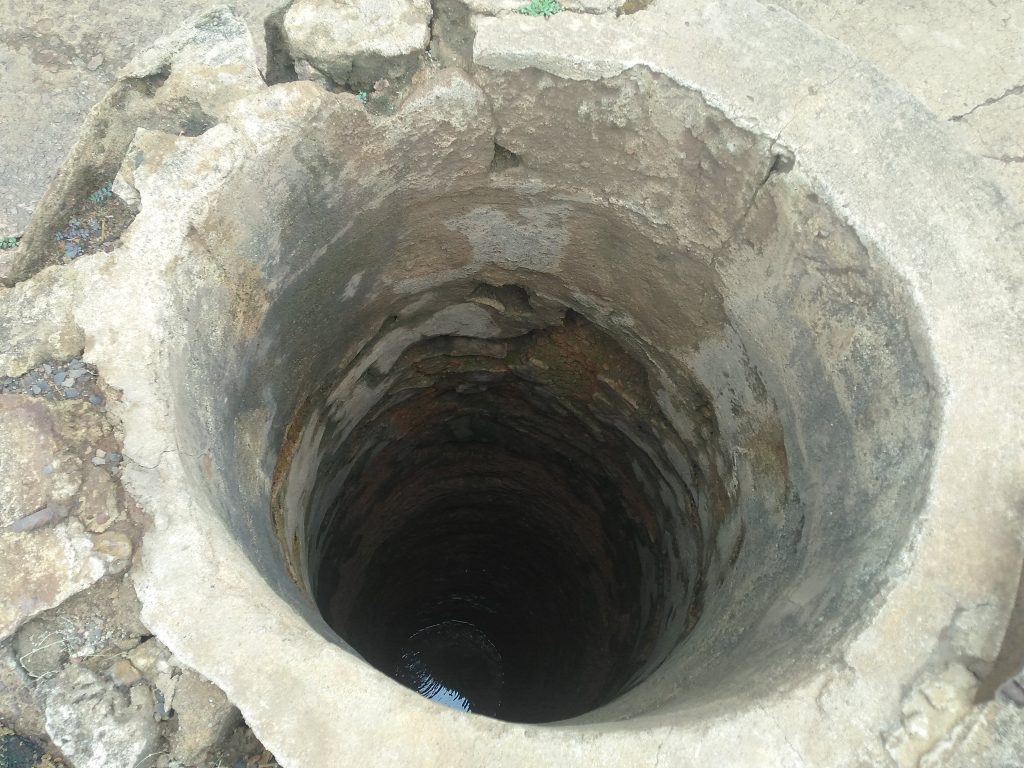
According to Ike, there are just a few places in Abakpa where the taps actually work.
“There is a tap working at the first bus stop. But in these densely populated areas, the taps have not worked for years,” he said.
“We buy water from the tanker suppliers; we have to buy water. We use the tanker water for cooking while we buy sachet water for drinking. There is always a delay when we order for water from the tanker. You have to wait for days before you get water.”
Other factors can impact the delivery of water by the last-resort tankers too.
“When the roads are bad, when gas is expensive, when there is no petrol… all these factors affect the water supply from the tankers too,” he said. “We are suffering in Abakpa. As regards water supply, we are really suffering. The situation is very bad, but there is nothing we can do about it.”
Like Mayor, Ike spoke about the high cost of sinking and maintaining boreholes.
“Who can afford to sink boreholes? Who has between N1million and N3million to sink boreholes?” he wondered.
“The terrain has affected this. In Anambra State, around Idemili, you can sink a borehole for between N100,000 and N200,000. But there is no place around where you can sink a borehole for less than N1million. The cost depends on the zone.”
“It is very difficult for everybody, it is not easy. The water corporation cannot even pump the water because everything is bad. Wells dry up, especially around January and February. Once the rains come, there will be water. But once we approach December, everywhere dries up again.”
OFFICE LOCKED. WATER CORPORATION STAFF ‘SITTING AT HOME’
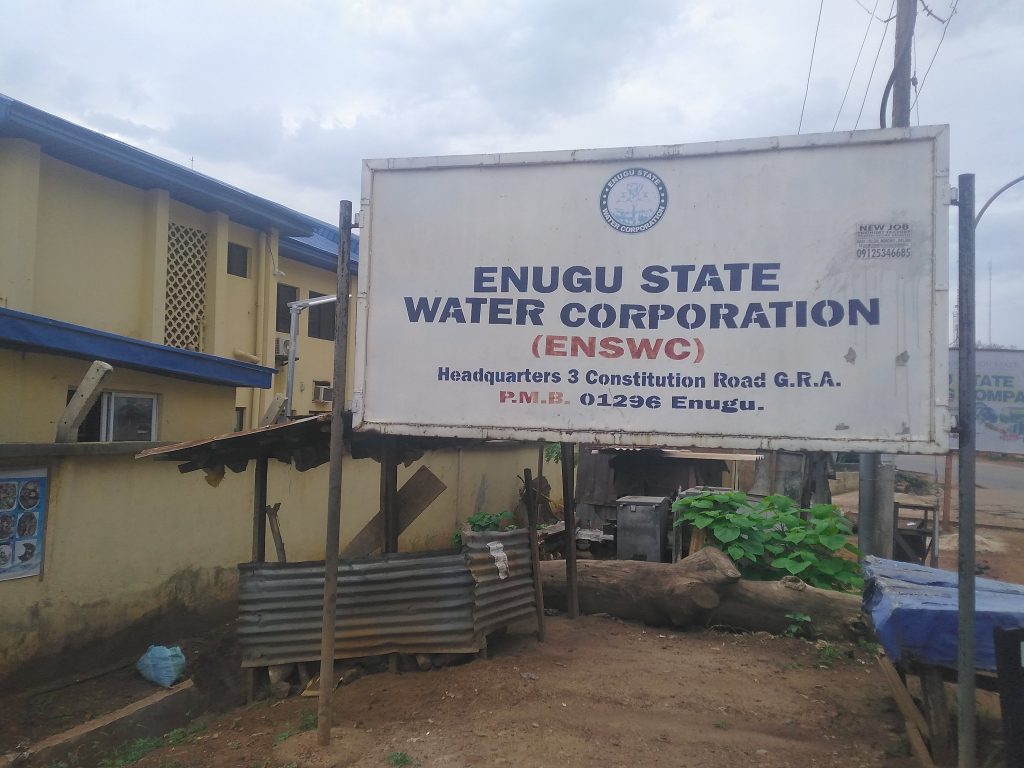
Three state government agencies are saddled with the responsibility of managing water resources in Enugu; Enugu State Water Corporation (ESWC), Enugu State Rural Water Supply and Sanitation Agency (ESRWSSA), and Small Towns Water and Sanitation Agency (STWSA).
Both ESRWSSA and STSWSA have stayed on the fringes while the state water corporation functions as the most significant water agency in Enugu.
Unfortunately, the water corporation has struggled to fulfill its duty in the past decade.
“I know that some people work in the state water corporation but I don’t think they are doing anything significant in the face of this annual water scarcity,” Buchi said. “Since I have moved to Enugu, I have lived in different places and I haven’t seen a tap working. It means they (the state water corporation) are not working.”
FIJ visited the office of Enugu State Water Corporation along Constitution Road but was unable to talk to anyone. The office was locked for the day due to the sit-at-home order observed in the southeastern state in accordance with the desires of the Nnamdi Kanu-led Indigenous People of Biafra (IPOB).
The state water corporation also failed to answer to enquiries made to its official email after several days.
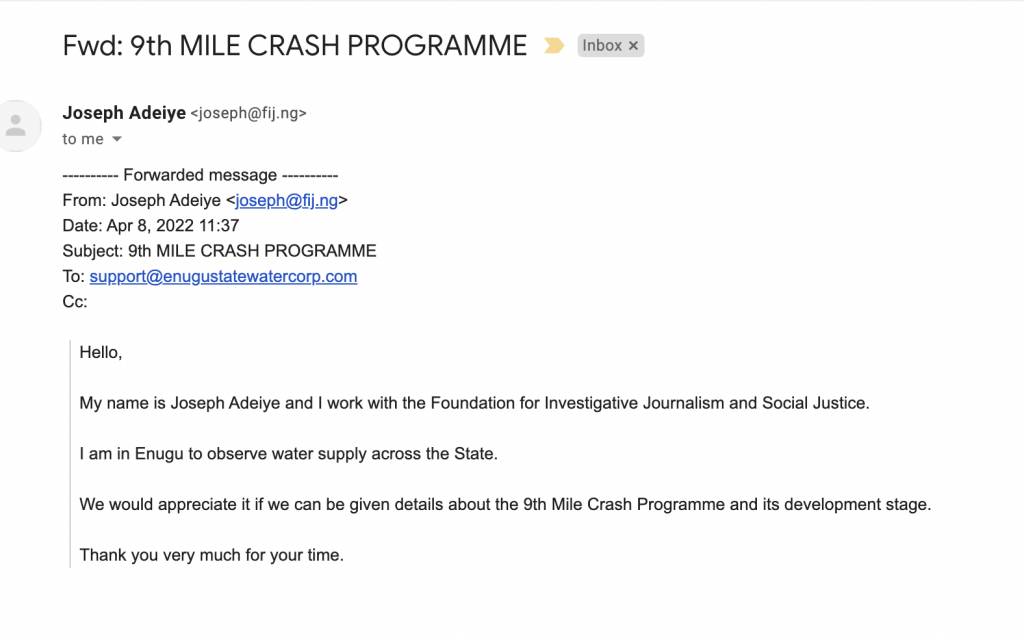
WATER TANKER DRIVERS PROFITING FROM THE CHAOS
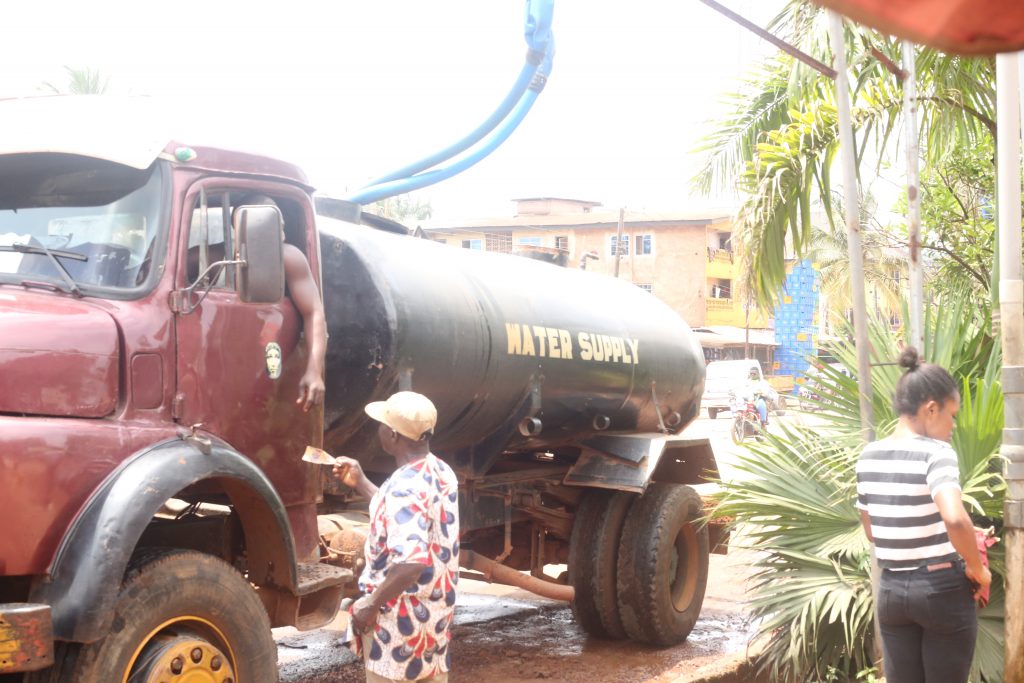
Harrison Uchechukwu, another Enugu resident, suspects the government is uninterested in solving the water problem in Enugu. His reason is something four other people have mentioned.
“I live in Nsukka. The government has not thought of the masses with regards to this water scarcity. It has been a very big problem that Enugu has faced,” he said.
“If you come to Independence Layout, the heart of Enugu, I’m not even sure if water is running in the government house. It is easy to get it done. We have clean water at 9th Mile; we just need a good engineer to make the water run from 9th Mile to Enugu.”
Harrison then went on to reveal his fears that the tanker drivers and vendors may be preserving the status quo, since they’re profiting from the crisis.
“The problem is maybe the tanker drivers association in Enugu are lobbying for this not to be done. There is nothing that cannot happen in Nigeria,” he said. “The last time I checked in to Enugu, my overhead tank of water from the tanker was N13,000. Water scarcity exists in Enugu just because the government is reluctant to end it.”
TAKING MATTERS INTO THEIR OWN HANDS
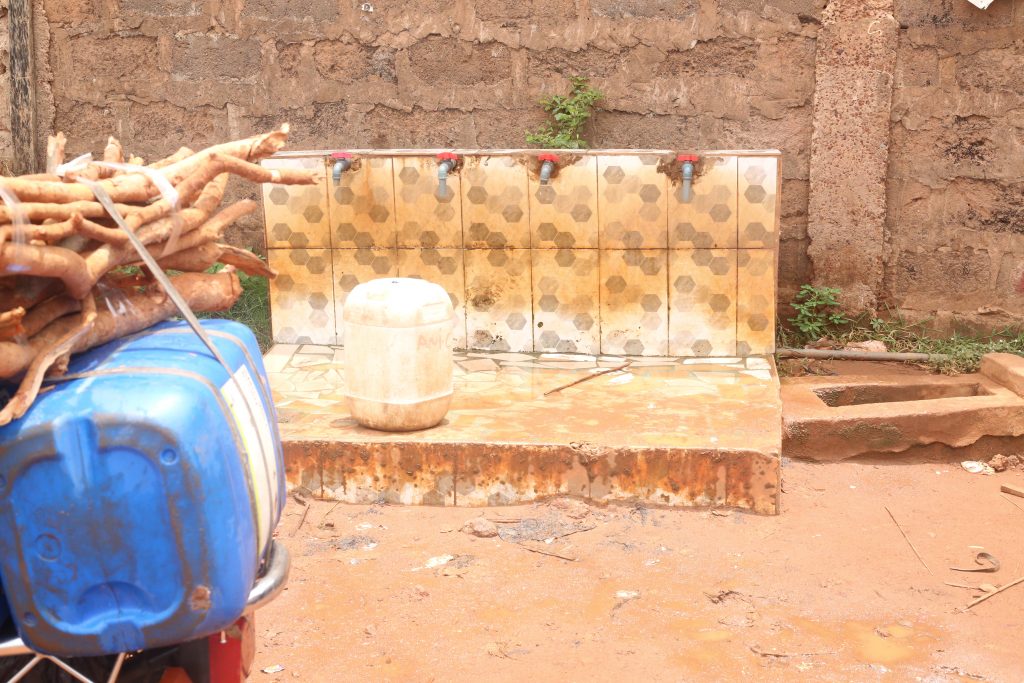
Many residents of Enugu have given up on the ability of the state to solve the recurrent water supply problem.
How to sum it up? FIJ saw a few persons push wheelbarrows loaded with jerrycans of water across the office of the state water corporation.
SIX SACHETS OF WATER FOR AN ADULT BATH
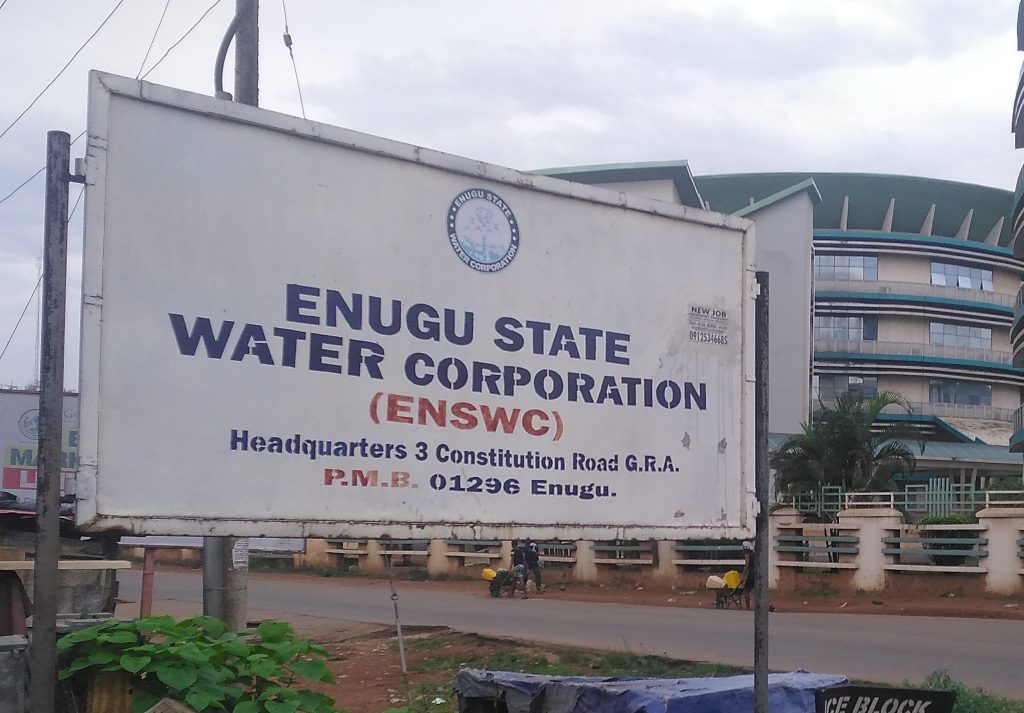
“We fetch our water ourselves. The taps are not running so we had to buy from those tankers bringing water from Ninth Mile,” said one of the people transporting water across the road.
He insisted he had to buy the water, when asked if he was not going to get it from the water corporation so close by.
“It is only if you enter their office that you may be able to use the water around here. Not everyone can come to the state corporation to fetch water,” he revealed.
Another Enugu resident who asked to simply be identified as ‘Gabriel’ told FIJ he bathes with sachet water sometimes. Drinking a limited amount of sachet water and using a few sachets of water to bathe is how far water scarcity has pushed him.
“We buy sachet water for drinking but we get water from the tankers for cooking. People who have access to small streams go there to get water,” he said.
“There is no stream close by. Some people actually go the distance to get water from milann; water that comes from the ground. Generally, people use tankers and vendors.”
Gabriel also heard of the construction that broke some pipes and has disrupted water supply ever since.
“I learnt the water supply was disrupted because of the ongoing road construction, I think around 9th Mile. I asked someone and I was told that the construction cut off some pipes.
“Since then, water supply has been poor. Sometimes, once a week, water will run. Other times, it will take several weeks before water runs.
“We are suffering for water seriously; we are suffering. We manage the water we use. Imagine an adult bathing with six sachets of water. We don’t drink as much water as we ought to. We have to manage it well.”
Gabriel confirmed that many hotels and other businesses buy water just like him.
“Hotels in Enugu buy water from tankers. That’s why they minimise. When you get there, you will see how they will set their shower. The water flow will be controled, so that there won’t be wastage,” he said.
“I have a friend who’s managing one big hotel. He told me they buy water every three days. With the number of tanks they have, you can imagine it costs a lot of money.”
IF YOU OWN 2 WATER TANKERS, YOU WILL BUILD 2 HOUSES IN A YEAR
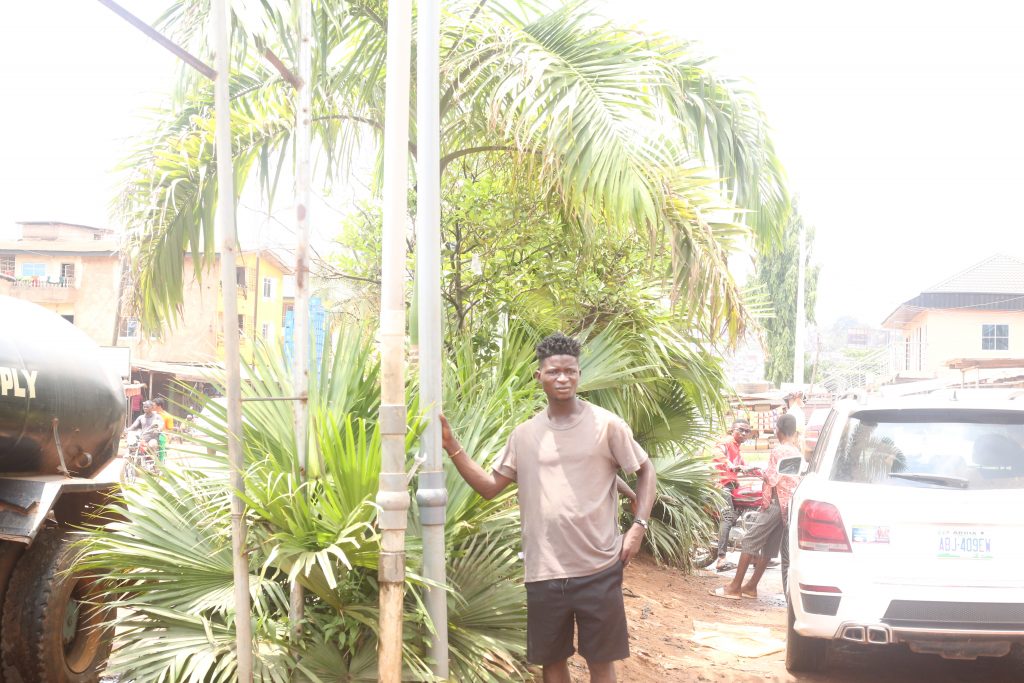
Water is serious business in Enugu. The water tankers dotting the streets of Enugu are so many that one cannot remember seeing petrol or gas tankers on the road.
Emmanuel Anyi, who lives in Uwani, explained how water supply has become such a lucrative business due to the high demand for water. Clean water is often tapped from 9th Mile and transported to the thirsty parts of Enugu.
“If you have two of those water tankers for business, you will build two houses in one year: one in Enugu and one in your village. Water tanker owners make so much money that they work whenever they feel like. You have to beg them to deliver the water on time even after you have paid for delivery.
“I beg the man who delivers water to my house with Ofe Onugbu soup and proper garri or Akpu. I always tell him that the food is waiting. He comes whenever I make such promises and I must not disappoint because I want him to come on time next time.”
Many individuals have a stranglehold on the water supply business in Enugu. One of such is Ibrahim Ahmed, who has lived in Enugu for 13 years and has run his water supply business for almost 10 of those.
“I am from Taraba state. I have lived here for 13 years now. The water business is my business,” he told FIJ.
“There are many water supply businesses here in 9th Mile because we have enough water to pump from the ground. People from all over Enugu come here to buy our water because it is clean.”
Five water tankers bought water from Ibrahim as he spoke with FIJ. A booming car wash business is beside his water depot. Yellow jerrycans arrived and departed in wheelbarrows too.
“I am pumping the water with gas. For now, gas is costly. I buy gas at N700 per kilogramme. I don’t know why government has not given them (his customers) water. But business is good,” Ibrahim said when asked about the role of the state government.
Nnenna Nwanduka, a mother of two who scanned my camera with inquisitive eyes, runs a water depot just 100 metres away from Ibrahim’s. The proximity of both depots clearly did not affect the influx of customers.
“Water is sold at N1,000 per 1000 gallons. Those small jerrycans pay N25 each. Tanker drivers pay between N1,000 and N2,500 here depending on their size,” Nnenna told FIJ.
“Water depots get between 30 and 60 tankers as buyers every day. As we approach the rainy season, the customers reduce since other sources of water collect the rain water.”
Water depots dominate all parts of Enugu. They are unofficially headquartered at 9th Mile due to its abundance of ground water. However, those who can afford to sink boreholes have made it a business.
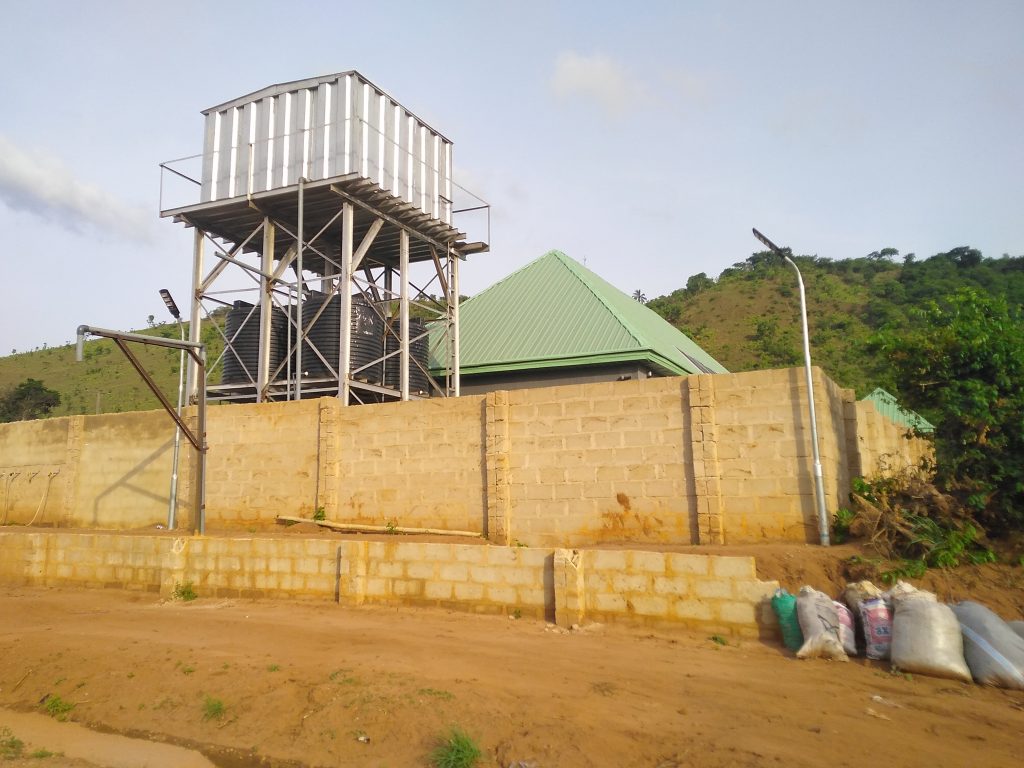
READ ALSO: Makoko Waterfront Lagos Community Neglected By Government
PENDING SOLUTIONS IN SUSPENDED ANIMATION
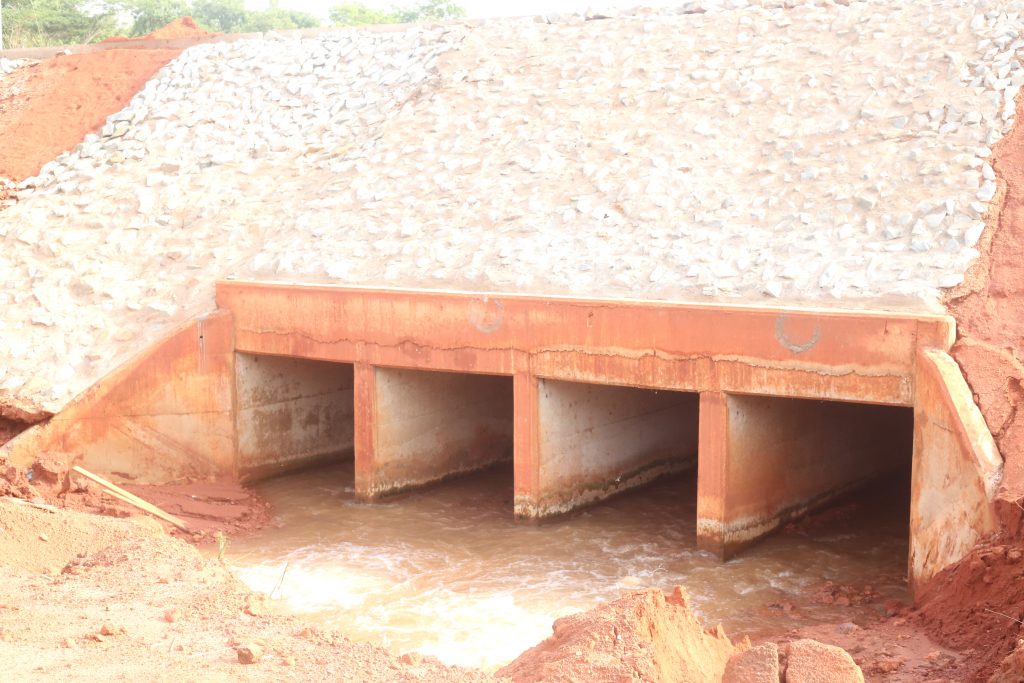
Most of the towns around the Enugu metropolis rely on water from 9th Mile. 9th Mile is very close to a large reserve of ground water. The water tankers often drive down to 9th Mile to purchase from private individuals such as Ibrahim to resell at retail prices. The Enugu state government however initiated a 9th Mile Crash Programme in Udi, around the Ngwo community, in January 2021.
The 9th Mile Crash Programme is the state government’s water borehole project, restarted in 2021. Ifeanyi Ugwuanyi, governor of the state, awarded a contract for the comprehensive rehabilitation of the 9th Mile Crash Programme Water Supply Scheme to FordMarx Nigeria Limited at the cost of N600 million.
The borehole plant was projected to be powered by solar panels to ensure stable operations. In November, FordMarx and the Enugu state government announced that the Ninth Mile borehole project was over 90 percent complete. It is May, seven months after, and the state government has gone mum on the project.
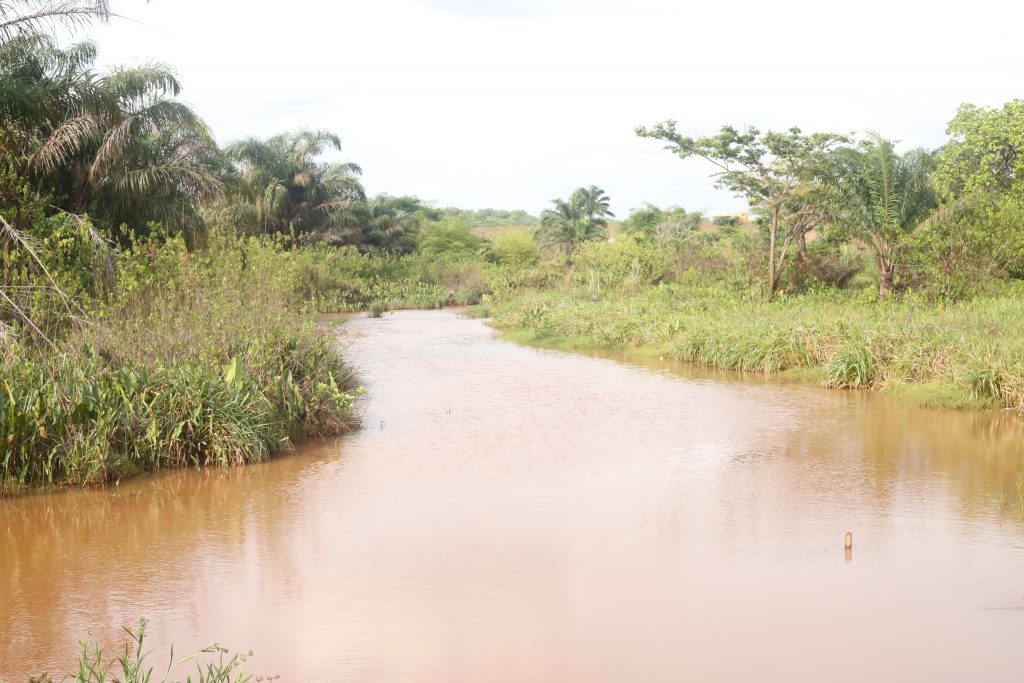
Another great water source with a halted government project sitting on its location is the Adada River along the Owele-Ogbede Road. A federal government project, the Adada River Dam, has been abandoned for over 10 years. The stalled two-billion-naira project in Nsukka has negatively impacted the use of the water in the river so far. Neither the state nor federal government has managed to build a single water treatment plant.
The communities around Adada river cannot properly benefit from its water, many pushing wheelbarrows and jerrycans to fetch water by the road side. Water depots exist so close to these communities but there are no taps or potable water provided by the government. So there is a source of water but the government has left them alone to manage their water, even when it is not safe for use.
Other sources of water such as Oji River, Iva, and Ajali have not been optimally utilised by the authorities towards supplying much-needed volumes of water to Enugu residents, meaning Enugu’s long-running water problem will not be over anytime soon.
This investigation was published with development support from the Open Society Initiative for West Africa (OSIWA)
Subscribe
Be the first to receive special investigative reports and features in your inbox.


